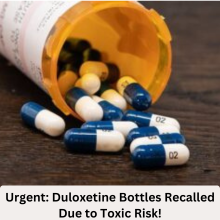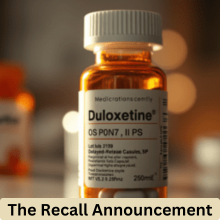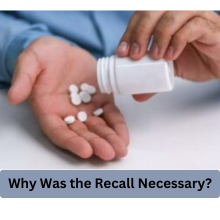
Recently, thousands of duloxetine bottles, marketed under the brand name Cymbalta, have been recalled due to concerns about a potentially toxic chemical. This situation has raised alarms among patients and healthcare professionals alike. Understanding what this recall means is essential for anyone taking this medication, especially given its widespread use for treating depression and anxiety.
What is Duloxetine
Understanding Duloxetine
Duloxetine is a commonly prescribed antidepressant, primarily used to manage conditions such as depression, anxiety, and chronic pain. It belongs to a class of medications known as serotonin-norepinephrine reuptake inhibitors (SNRIs). By increasing levels of serotonin and norepinephrine in the brain, duloxetine helps improve mood and relieve pain.
How Duloxetine Works
So, how does it actually work? Duloxetine inhibits the reuptake of serotonin and norepinephrine, which are neurotransmitters that play crucial roles in mood regulation and pain perception. This dual-action is what makes it effective for both mental health and certain types of pain, making it a go-to option for many healthcare providers.
The Recall Announcement
Details of the Recall
On October 10, 2024, the FDA announced a recall involving over 7,100 bottles of duloxetine. This specific recall focused on 500 delayed-release 20mg capsules, identified by lot number 220128 and set to expire in December 2024. This means that if you have these particular bottles, you need to take action.
FDA’s Classification of the Recall
The recall was classified as Class II by the FDA. This classification indicates that the drug could cause “temporary or medically reversible adverse health consequences.” While this might sound alarming, it’s essential to understand that this is not the most severe classification, which provides a bit of reassurance.
The Toxic Chemical: N-nitroso-duloxetine
What is N-nitroso-duloxetine?
The chemical at the center of this recall is N-nitroso-duloxetine. It’s considered toxic and is classified as a nitrosamine, a group of chemicals that can form in various products. These chemicals can be harmful if ingested and are suspected to have carcinogenic properties.
Cancer Risk
The presence of N-nitroso compounds raises serious concerns regarding cancer risk. Long-term exposure to high levels of nitrosamines can increase the likelihood of developing certain types of cancer. The FDA has established strict guidelines regarding the permissible levels of these compounds in medications, and it appears that these limits were exceeded in this case.
Why Was the Recall Necessary?
Manufacturing Issues
So, why did this happen? The presence of nitrosamines can be attributed to various factors, including the manufacturing process, the chemical structure of the drug, and even how the product is stored and packaged. The FDA is actively investigating these factors to prevent future occurrences.
Regulatory Standards
The FDA imposes strict regulations on the permissible levels of nitrosamines in drugs. In this instance, it was found that the levels in duloxetine exceeded those limits, prompting the recall. The goal is to ensure that patients receive safe and effective medications.
What Should Patients Do?
Consult Your Healthcare Provider
If you’re currently taking duloxetine, it’s crucial to consult your healthcare provider. Do not stop taking your medication suddenly, as this can lead to withdrawal symptoms and exacerbate your condition. Your doctor can guide you on the best course of action tailored to your specific needs.
Also read: MTV EMAs 2024: Star-Studded Performers Revealed for Manchester
Identifying Affected Bottles
Wondering if your medication is part of the recall? Check the lot number and expiration date on your bottle. If it matches the recalled lot (220128, expiring 12/2024), it’s essential to stop using it immediately and seek alternatives.
Broader Implications of the Recall
Impact on Mental Health Treatment
This recall raises broader concerns about mental health treatment. Many individuals rely on duloxetine for stability in their daily lives, and the fear of unsafe medication can add to their stress. It’s vital for patients to feel secure in their treatment plans.
Trust in Pharmaceutical Companies
This situation also highlights the importance of trust in pharmaceutical companies. Patients need to have confidence that the medications they are prescribed are safe. Incidents like this can lead to skepticism, emphasizing the need for stringent quality control measures.
Looking Forward: What’s Next?
Ongoing Investigations
The FDA is currently investigating the source of the nitrosamines in duloxetine. They aim to provide clarity on how this happened and what measures will be implemented to prevent future issues. Patients can expect updates as the situation develops.
Future Precautions
Moving forward, the pharmaceutical industry may implement stricter regulations and monitoring to ensure that similar recalls do not occur. This is crucial for restoring public confidence in medications and their safety.
Conclusion
The recall of duloxetine bottles is a significant issue that affects many individuals relying on this medication. Understanding the reasons behind the recall, the implications for health, and the necessary steps to take can help you navigate this situation effectively. If you’re affected, remember to consult your healthcare provider for personalized advice.
Also read: LeBron & Bronny: The Historic Father-Son NBA Debut
FAQs
What are the symptoms of N-nitroso-duloxetine exposure?
Common symptoms may include nausea, vomiting, and abdominal pain. However, exposure risks are mostly related to long-term ingestion.
How can I find out if my duloxetine is recalled?
Check the lot number and expiration date on your medication bottle against the FDA’s recall announcement.
What alternatives exist for duloxetine?
Your healthcare provider can discuss alternative medications, including other SNRIs or SSRIs, based on your individual needs.
How does the FDA ensure drug safety?
The FDA conducts regular inspections, requires extensive testing before approval, and monitors products for safety post-market.
What are nitrosamines and why are they dangerous?
Nitrosamines are a group of chemicals associated with an increased risk of cancer when found in high concentrations, often originating from manufacturing processes.

